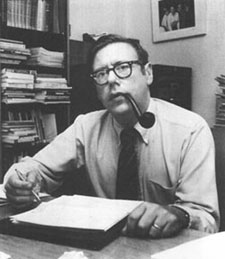
Arthur Melvin Okun
Arthur Melvin "Art" Okun (November 28, 1928 – March 23, 1980) was an American economist. He served as the chairman of the Council of Economic Advisers between 1968 and 1969. Before serving on the C.E.A., he was a professor at Yale University and, afterwards, was a fellow at the Brookings Institution in Washington, D.C. In 1968 he was elected as a Fellow of the American Statistical Association.[1]
Art Okun
Okun is known in particular for promulgating Okun's law, an observed relationship that states that for every 1% increase in the unemployment rate, a country's GDP will be roughly an additional 2.5% lower than its potential GDP. He is also known as the creator of the misery index and the analogy of the deadweight loss of taxation with a leaky bucket.[2] He died on March 23, 1980, of a heart attack.[3]
Okun graduated from Columbia College in 1949 with the Albert Asher Green Memorial Prize for the highest GPA.[4] He went on to obtain a Ph.D. in economics from Columbia in 1956 before teaching at Yale University.[5]